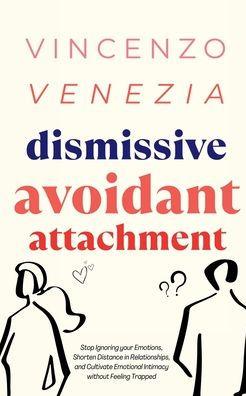Dismissive Avoidant Attachment: Stop Ignoring your Emotions, Shorten Distance in Relationships and Cultivate Emotional Intimacy without Feeling Trappe

Dismissive Avoidant Attachment: Stop Ignoring your Emotions, Shorten Distance in Relationships and Cultivate Emotional Intimacy without Feeling Trappe
The relationships we had as children with our parents, or whoever, have a profound effect on how we react to certain situations in our lives and how we interact with the people around us.
Avoidant-dismissive attachment is a behaviour pattern that involves a high level of avoidance in intimacy and a low level of abandonment anxiety. When intimacy increases, people express avoidant patterns and adopt distancing tactics out of discomfort. They tend to deny feelings and take their sovereignty to extremes. They do not rely on others and do not want others to rely on them, keep their innermost thoughts to themselves and have difficulty asking for help.
Avoidant scorners value independence. Any need to rely on someone else triggers a sense of weakness.
In childhood, parents were probably emotionally absent or were very rigid and minimised the importance of expressing their needs for physical and emotional connection.
For these children, whenever emotional support was sought in the past, it was not provided. So, they simply stopped seeking it or expecting it from others. It is as if they have "turned off the emotional switch."
When growing up, as a result, they have a tendency to suppress the natural instinct to seek comfort from others. In relationships they tend to pull away and feel suffocated when vulnerability increases.
I recommend reading this manual if you have experienced in your romantic relationship and in your relationship with yourself: - A strong sense of self. - Independence as a person, content to take care of yourself and do not feel you need others. - You see vulnerability as a weakness. - Discomfort with your emotions; your partner often accuses you of being too closed, distant, intolerant and rigid. - Use of sarcastic tones by yourself that always end up hurting and putting distance between friends, co-workers and your own partner. - The suppression of emotional experiences. - A tendency to minimise or ignore your partner's feelings, keep them secret, engage in other relationships and even end the relationship in order to regain your sense of freedom.
PRP: 123.94 Lei
Acesta este Pretul Recomandat de Producator. Pretul de vanzare al produsului este afisat mai jos.
111.55Lei
111.55Lei
123.94 LeiLivrare in 2-4 saptamani
Descrierea produsului
The relationships we had as children with our parents, or whoever, have a profound effect on how we react to certain situations in our lives and how we interact with the people around us.
Avoidant-dismissive attachment is a behaviour pattern that involves a high level of avoidance in intimacy and a low level of abandonment anxiety. When intimacy increases, people express avoidant patterns and adopt distancing tactics out of discomfort. They tend to deny feelings and take their sovereignty to extremes. They do not rely on others and do not want others to rely on them, keep their innermost thoughts to themselves and have difficulty asking for help.
Avoidant scorners value independence. Any need to rely on someone else triggers a sense of weakness.
In childhood, parents were probably emotionally absent or were very rigid and minimised the importance of expressing their needs for physical and emotional connection.
For these children, whenever emotional support was sought in the past, it was not provided. So, they simply stopped seeking it or expecting it from others. It is as if they have "turned off the emotional switch."
When growing up, as a result, they have a tendency to suppress the natural instinct to seek comfort from others. In relationships they tend to pull away and feel suffocated when vulnerability increases.
I recommend reading this manual if you have experienced in your romantic relationship and in your relationship with yourself: - A strong sense of self. - Independence as a person, content to take care of yourself and do not feel you need others. - You see vulnerability as a weakness. - Discomfort with your emotions; your partner often accuses you of being too closed, distant, intolerant and rigid. - Use of sarcastic tones by yourself that always end up hurting and putting distance between friends, co-workers and your own partner. - The suppression of emotional experiences. - A tendency to minimise or ignore your partner's feelings, keep them secret, engage in other relationships and even end the relationship in order to regain your sense of freedom.
Detaliile produsului








